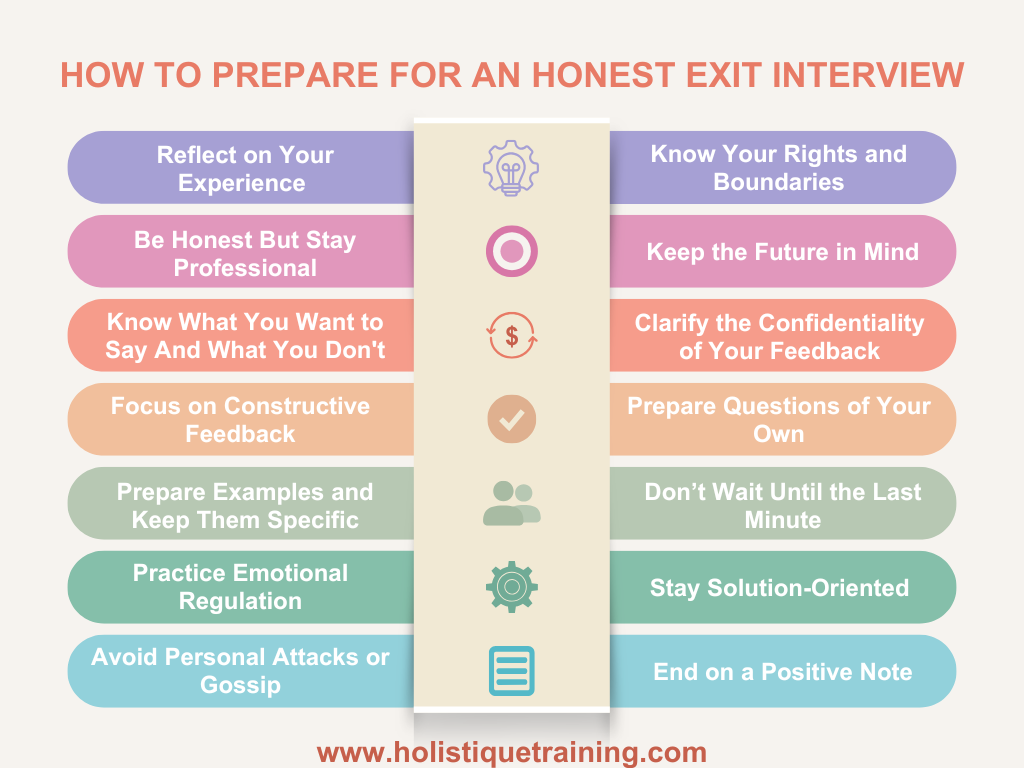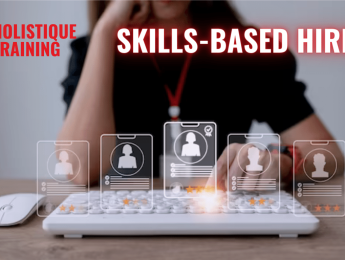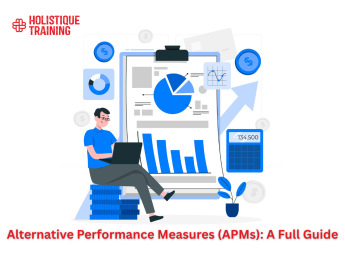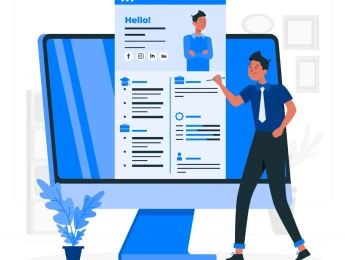- Table of Contents
- Introduction
- What Is an Exit Interview?
- Who Benefits from Exit Interviews?
- The Real Purpose Behind Exit Interviews
- Improving Organizational Culture
- Understanding Employee Turnover
- Supporting Transparency and Dialogue
- Common Employee Concerns About Exit Interviews
- 1. Fear of Retaliation
- 2. Loss of Reference
- 3. Confidentiality Doubts
- 4. “It Won’t Change Anything”
- Why Honesty Can Be Empowering (But Risky)
- Finding the Right Balance
- What Companies Actually Do With Your Feedback
- How to Prepare for an Honest Exit Interview: Tips and Strategies
- 1. Reflect on Your Experience Before the Interview
- 2. Be Honest But Stay Professional
- 3. Know What You Want to Say And What You Don't
- 4. Focus on Constructive Feedback
- 5. Prepare Examples and Keep Them Specific
- 6. Practice Emotional Regulation
- 7. Avoid Personal Attacks or Gossip
- 8. Know Your Rights and Boundaries
- 9. Keep the Future in Mind
- 10. Clarify the Confidentiality of Your Feedback
- 11. Prepare Questions of Your Own
- 12. Don’t Wait Until the Last Minute
- 13. Stay Solution-Oriented
- 14. Follow Up If Needed
- 15. End on a Positive Note
- Conclusion
Introduction
Leaving a job is a significant transition, filled with a mix of emotions: relief, anxiety, excitement, and sometimes frustration. One essential yet often overlooked step in this process is the exit interview. While some employees view it as a mere formality or an awkward obligation, others see it as a rare opportunity to speak openly. However, not everyone feels confident or safe being completely honest.
An honest exit interview isn’t just about venting frustrations—it can be a powerful moment of professional reflection and even an act of constructive contribution to your former organization. But navigating this conversation with clarity, tact, and preparation is essential to make the most out of it without jeopardizing future references or relationships.
In this article, we will explore what an exit interview is and the real purpose behind it, especially when honesty is involved. We’ll also look at the common concerns employees often face during these conversations, and reflect on when honesty can be empowering or risky. You'll gain insight into what companies actually do with your feedback, and most importantly, how to prepare for an honest exit interview with confidence. We’ll close with a final reflection to help you learn from the experience and move forward with clarity.
Let’s begin by understanding what exactly an exit interview is and why it’s more than just a checkbox at the end of your employment.
What Is an Exit Interview?
An exit interview is a structured conversation, typically held between a departing employee and a representative from Human Resources (HR) or management. It’s usually conducted in the final days of employment, either in person, over the phone, or via a survey.
Exit interviews aim to gather feedback on your experience with the company—your reasons for leaving, challenges you faced, and your general views on management, workplace culture, and team dynamics. The feedback may inform future improvements and retention strategies.
Who Benefits from Exit Interviews?
Both the employer and the employee stand to gain:
- Employers get direct insights into systemic issues such as poor leadership, unclear career paths, or toxic work environments.
- Employees, on the other hand, can leave a final, professional impression while voicing their thoughts in a constructive way.
Exit interviews also offer closure, helping both parties part ways on relatively good terms especially if the process is respectful and thoughtfully conducted.
The Real Purpose Behind Exit Interviews
The stated purpose of an exit interview is to collect data that can help the company improve. But the real depth of this process lies in how honest and insightful the conversation becomes.
Improving Organizational Culture
When conducted with sincerity, exit interviews reveal blind spots in leadership or processes. They can surface recurring issues that management may have been unaware of—such as inconsistent feedback, discrimination, or overwork—paving the way for real reform.
Understanding Employee Turnover
If multiple employees leave for similar reasons, the company can identify patterns and adjust policies or leadership approaches. Honest feedback helps distinguish between personal reasons and structural problems.
Supporting Transparency and Dialogue
A company that encourages open and honest exit interviews signals a commitment to transparency and respect. It fosters a feedback-rich culture and might retain more talent in the long run.
However, whether this purpose is fulfilled often depends on the organizational culture and the interviewer’s intent—which brings us to the concerns many employees face.
Common Employee Concerns About Exit Interviews
Even though exit interviews are meant to be safe spaces, many employees hesitate to be completely open. Here are four common concerns:
1. Fear of Retaliation
Employees may worry that honest criticism could burn bridges, especially if they’re staying in the same industry or city. This fear is heightened in environments where management has previously reacted poorly to feedback.
2. Loss of Reference
Departing employees often fear that if they say too much, they might lose the ability to use the company—or a specific manager—as a reference for future jobs.
3. Confidentiality Doubts
Not all employees believe their responses will stay private. If a company lacks a culture of discretion, employees may assume their words will circulate, risking reputation damage or strained relationships.
4. “It Won’t Change Anything”
A common belief is that the feedback won’t lead to any real change. This makes employees feel the interview is pointless, leading them to answer diplomatically or not at all.
These concerns are valid and understandable. But can honesty still be the right choice?
Why Honesty Can Be Empowering (But Risky)
Honesty in an exit interview is a double-edged sword. On one hand, it’s liberating and ethical. On the other, it can backfire if not handled wisely.
Here’s a quick comparison:
Pros of Being Honest | Cons of Being Too Honest |
Provides closure and personal relief | May harm relationships or reputation |
Helps the company improve | Could be misunderstood or dismissed |
Shows professionalism and integrity | May impact future reference potential |
Can empower others through shared insights | Might lead to gossip or retaliation |
Finding the Right Balance
Honesty should be measured, respectful, and specific. Avoid personal attacks or emotionally charged language. Instead, focus on constructive criticism and frame feedback in ways that emphasize improvement.
Example:
❌ “My manager was a micromanaging nightmare.”
✅ “I often felt over-managed, which limited my sense of autonomy. A more trust-based approach could help future team members thrive.”
What Companies Actually Do With Your Feedback
What happens after you walk out of the room? That depends greatly on the type of organization you’re leaving.
Possible Uses of Feedback
- HR aggregates responses over time to identify trends.
- Leadership may be briefed on key patterns affecting turnover.
- Departments might receive summaries to improve processes or management styles.
However, this ideal scenario doesn't always play out. Is It Just a Formality?
In some companies—especially those with weak HR systems or rigid hierarchies—exit interviews are more of a checkbox than a genuine feedback tool. Your feedback may be filed away, unread, or even ignored.
Here’s a breakdown of different organizational behaviors:
Type of Company | Response to Feedback |
Progressive/Transparent | Reviews and discusses feedback quarterly, acts on trends |
Conservative/Hierarchical | Acknowledges feedback but rarely acts unless pressured |
Disengaged or Toxic | Files feedback without reading; avoids accountability |
Bottom Line
Understanding your company's feedback culture can help you decide how honest or diplomatic to be. If you’re unsure, speak with former colleagues who’ve left or observe how the company handles internal concerns.
How to Prepare for an Honest Exit Interview: Tips and Strategies
Preparing for an honest exit interview requires more than just showing up and answering questions. It's a delicate balance between expressing your true experience and maintaining professionalism. Here’s a detailed guide to help you navigate this conversation effectively and leave a positive final impression, while still speaking your truth:

1. Reflect on Your Experience Before the Interview
Before your exit interview, take some time to reflect on your journey with the company. Think about your achievements, the challenges you faced, the support (or lack thereof) you received, and your reasons for leaving. Write down a few key points so you're clear on what matters most to you. Having these thoughts organized will help you stay focused and articulate during the conversation.
According to a 2023 Gallup report, employees who take time to reflect before giving feedback provide more constructive and balanced insights, increasing the likelihood that their input will be taken seriously.
2. Be Honest But Stay Professional
Honesty doesn't mean venting or placing blame. It means speaking truthfully in a constructive, respectful tone. For example, if your manager lacked communication skills, you could say, “I believe clearer communication from leadership would have helped my team work more efficiently,” rather than “My manager never told us anything.”
This approach allows you to share valuable insights without burning bridges.
3. Know What You Want to Say And What You Don't
There’s no obligation to share everything. Set personal boundaries beforehand. If there are topics you feel uncomfortable discussing such as interpersonal conflicts, personal issues, or sensitive incidents it’s okay to skip them or speak in general terms. Prioritize what will be most useful for the company to hear and what aligns with your values.
4. Focus on Constructive Feedback
Instead of only listing what went wrong, try to frame your observations in a way that helps the company improve. Highlight areas where processes could be better, communication could be clearer, or support systems could be stronger. Pair criticism with suggestions where possible.
For instance: “The workload was often overwhelming; assigning clear roles might help future team members manage their time better.”
5. Prepare Examples and Keep Them Specific
General statements like “the culture was bad” are often too vague to be actionable. Instead, offer specific examples: “Team meetings often lacked clear agendas, which led to confusion and duplicated efforts.” This makes your feedback more credible and easier for HR to understand and act on.
6. Practice Emotional Regulation
Exit interviews can stir up strong emotions, especially if your experience was negative. Practice calming techniques like deep breathing, mental rehearsals, or writing down your thoughts beforehand to keep your tone neutral and composed. This helps prevent the conversation from becoming emotionally charged or unproductive.
7. Avoid Personal Attacks or Gossip
Even if you had a difficult manager or unpleasant colleague, avoid turning the interview into a personal critique. Instead of saying, “Sarah was incompetent,” try, “There were challenges with how team responsibilities were managed, which created confusion and friction.” Stick to behaviors, not personalities.
8. Know Your Rights and Boundaries
You have the right to decline certain questions or topics. If you feel pressured to speak about something you’d prefer to avoid, it’s okay to say, “I’m not comfortable discussing that.” Similarly, be aware of any non-disclosure or confidentiality agreements you’ve signed, and avoid breaching them during the interview.
9. Keep the Future in Mind
Remember, this is your final impression. Even if you’re leaving on bad terms, people will remember how you handled your departure. Staying respectful, honest, and composed can help preserve professional relationships and ensure positive references down the line.
According to a 2022 LinkedIn Workplace Trends report, 71% of employers said they consider the tone of an employee’s exit when providing future references.
10. Clarify the Confidentiality of Your Feedback
At the beginning of the interview, it’s fair to ask how your feedback will be used and whether it will remain anonymous. This helps set expectations and gives you peace of mind. Some organizations summarize themes across multiple exit interviews, while others may share comments directly with management. Knowing this can shape how openly you speak.
11. Prepare Questions of Your Own
Exit interviews aren’t just for the company—they’re for you, too. Ask about your final paycheck, benefits, recommendations, or any next steps in the offboarding process. You can also inquire whether your feedback will be followed up on. This shows you're engaged and leaves you informed as you close this chapter.
12. Don’t Wait Until the Last Minute
If you know your exit interview is scheduled, don’t walk in unprepared. Take at least 30–60 minutes beforehand to gather your thoughts, revisit key moments from your employment, and mentally rehearse how you’d like to phrase things. This preparation ensures you’re clear, confident, and composed during the conversation.
13. Stay Solution-Oriented
Even when discussing challenges, keep your tone future-focused. Think of it as helping the company grow rather than just airing grievances. You might say, “While I struggled with the lack of career progression, I think clearer internal pathways could help future employees thrive.”
14. Follow Up If Needed
If you forget to mention something important or want to clarify your feedback, don’t hesitate to send a follow-up email. It shows professionalism and reinforces your intention to provide helpful, thoughtful input.
15. End on a Positive Note
Regardless of your experience, try to end the interview with appreciation. Thank the interviewer for their time and express gratitude for the opportunities you had. A simple “I learned a lot and appreciate the support I received in my early months here” can leave a lasting positive impression.
Conclusion
Exit interviews aren’t just a formality; they are a final opportunity to be heard. Done thoughtfully, an honest exit interview can leave a lasting positive impression, inspire change, and empower both you and your former company.
To sum up:
- Understand the purpose of exit interviews and how to navigate them wisely.
- Balance honesty with tact to avoid burning bridges.
- Prepare thoroughly to ensure your message is clear and impactful.
At the end of the day, your words have weight. Don’t underestimate the value of your experience and the potential ripple effects of sharing it constructively.
Want to sharpen your communication and career navigation skills?
Join our professional development courses where we teach real-world strategies for workplace challenges, including negotiation, job transitions, and handling difficult conversations.
Enroll today and walk into your next role—or your next exit—with clarity and confidence.

























